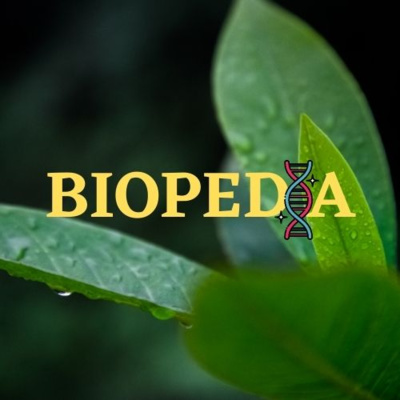
Biopedia
Biology is a fascinating subject which is well worth exploring. Its scope stretches from individual DNA strands and viruses to blue whales, metapopulations and the biosphere. We will shine the spotlight on a different biological concept in every episode. Topics I've covered in the past include the origins of cell theory, Dollo's law and the Anthropocene; however, there is still plenty more to discover. Our focus will range from the very smallest scales to the very largest; from virions to the Gaia hypothesis. So come and explore the fascinating world of biology, one episode at a time!
- Update frequency
- every 10 days
- Average duration
- 5 minutes
- Episodes
- 131
- Years Active
- 2020 - 2025

Island Folk 2- Britain and the Island Fortress
Another day, another episode of Island Folk! Sean Dettman and I discussed the concept of the island fortress as it was perceived in WW2 Britain. Basically, this is the idea that the inhabitants of th…

60- Porphyria
In today's episode, we revisit an old blog post from all the way back in January 2021. George III of the United Kingdom is probably the person most famously associated with porphyria. However, what i…

Island Folk 1- Rapa Nui
My inaugural Island Folk episode has launched! In it, Sean Dettman and I discuss the history of Rapa Nui in relation to the removal of the island's trees, and whether it was this that proved the deat…

Announcement- Island Folk
Hello everyone, quick announcement- I've been offered the chance to host a radio programme! Island Folk- the show where we talk about islands and play folk music- forms part of Hautlieu Radio. My bac…

59- James E. Lovelock
James Ephraim Lovelock, best known for the Gaia hypothesis, died on the 26th of July 2022, on his 103rd birthday. In his honour, this episode is going to detail some of his achievements. During our d…

58- Islamic Golden Age Evolutionary Theory
The traditional narrative of the history of biology as a field focusses on the West. As such, other regions of the world are underdiscussed- which is important when discussing how to decolonise our c…

57- Benedict's Test
Today's topic is a return to the world of biochemistry with a discussion of Benedict's test- used to test for reducing sugars and, with some modifications, non-reducing sugars. We won't be discussing…

Darwin Day 2022- HMS Beagle
As of February 12th 2022, it's been 113 years since Charles Robert Darwin was born. As such, we're back with another Darwin Day episode! This time around, we turn our attention to His Majesty's Ship …

56- Three Types of Selection
Natural selection is not just one phenomenon, but can be spliced into different types depending on what its action results in. Today's episode will examine disruptive selection, stabilising selection…

55- Hybridomas
Cultured cells are useful, but have their limitations. For instance, B cells- white blood cells which produce antibodies- have a limited lifespan in vitro, meaning their use for making antibodies com…

54- Bonsai Trees
Perhaps you've never thought much about bonsai trees. However, their existence does raise some biologically relevant questions. For instance, how is a bonsai tree created? Moreover, as we'll see in t…

53- Grolar Bears
We're going to explore a particular kind of hybridisation today- the kind that produces grolar bears. As the name might suggest, this refers to the offspring of a grizzly bear and a polar bear. Its e…

52- Great American Interchange
Back in episode 49, I mentioned the Great American Interchange, which took place three million years ago when North America and South America collided and were connected by the isthmus of Panama. How…

51- RuBisCO, C4 and CAM
Photosynthesis has proven a useful tool in life's arsenal, but it isn't perfect. This is because one of its enzymes- RuBisCo for short- is not equipped to deal with our oxygenated world and as such s…

50- Kin Selection and Hamilton's Rule
Altruism- or actions by organisms which ultimately provide a benefit to other organisms- have been puzzling evolutionary scientists since Darwin's time. As such, attempts have been made to explain ho…

49- The Wallace Line
If Alfred Russell Wallace (1823- 1913) is thought of at all, he is an after-thought to his far more famous counterpart Charles Darwin and the theory of natural selection. However, he has also had an …

48- The Creation of Chromosome 2
It's a well-known fact that humans have 23 pairs of chromosomes- 46 chromosomes in total. However, chimpanzees have 48 chromosomes, as do the other 'great apes'. Why is this? Well, it centres around …

47- Sibling Species
Moving away from previous topics somewhat, we're going to dive back into ecological theory and discuss the concept of sibling species. What is a sibling species? Well, they're species which appear br…

46- Ediacaran Biota
Today, we're going to be discussing the Ediacaran fauna. This is a faunal assemblage that came before the Cambrian Explosion (535-525 Mya) but is less well known. Unlike the Cambrian Explosion- which…

45- The DNA of Louis XVI
Almost no French king is more famous than Louis XVI, reigning during the turbulent times of the French Revolution at the tail-end of the eighteenth century. Previous studies have attempted to charact…